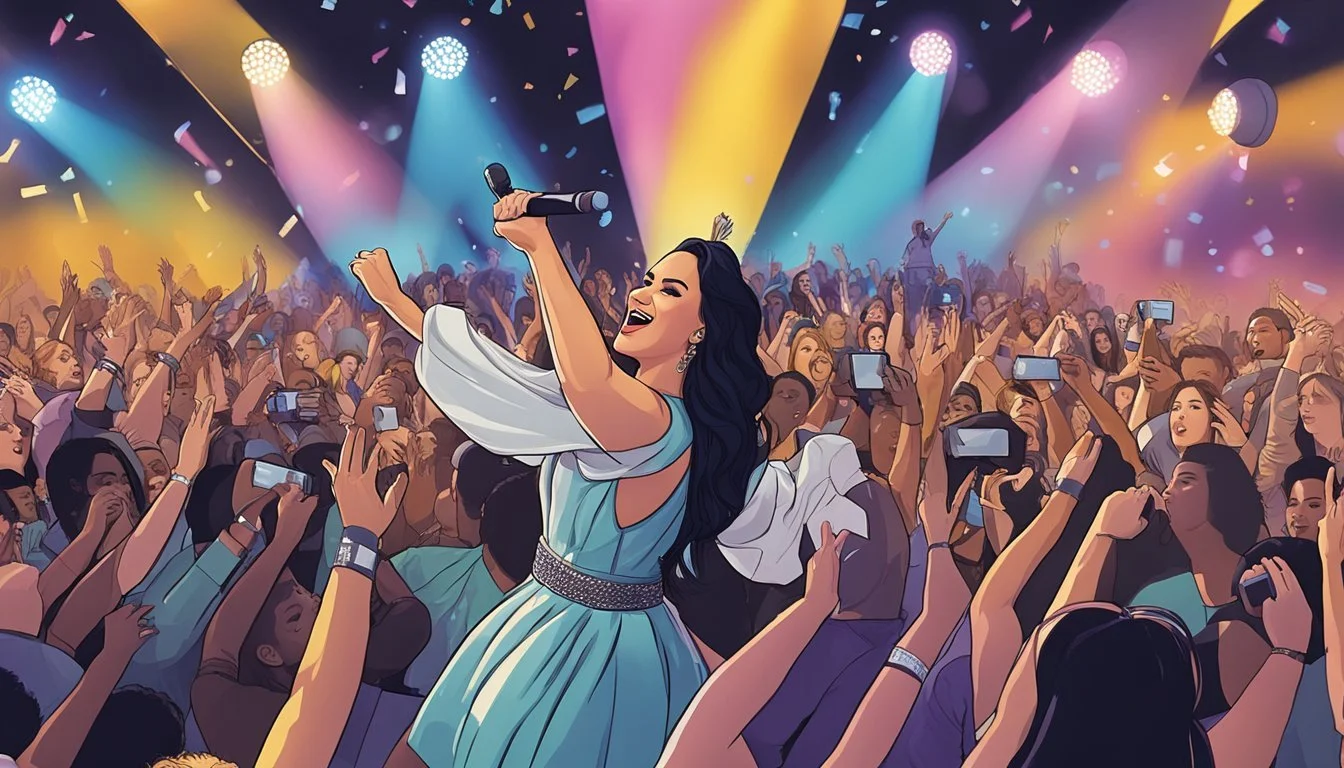Demi Lovato's Dark Secrets Exposed: The Shocking Truth Behind the Music
Demi Lovato's life and career have captivated audiences for years, and her recent documentaries offer an intimate look behind the scenes. These films provide raw, unfiltered glimpses into the singer's personal struggles and triumphs.
"Demi Lovato: Dancing With The Devil" explores the events leading up to her near-fatal overdose in 2018 and her subsequent journey of recovery. The four-part YouTube series features candid interviews with Lovato, her family, and close friends, shedding light on the pressures of fame and the challenges of addiction.
Another notable documentary, "Demi Lovato: Simply Complicated," delves into earlier periods of the artist's life. Released in 2017, this film offers insights into Lovato's rise to stardom and her ongoing battle with mental health issues. Both documentaries showcase Lovato's resilience and her commitment to using her platform to raise awareness about important social issues.
Early Life and Rise to Fame
Demi Lovato's journey to stardom began at a young age, propelling her from child actor to Disney sensation and eventually to a successful music career.
Child Star Origins
Demi Lovato was born on August 20, 1992, in Albuquerque, New Mexico. She showed an early interest in performing arts, starting piano lessons at age 7 and acting classes soon after. At just 10 years old, Lovato landed her first television role on the children's show "Barney & Friends."
This early exposure to the entertainment industry set the stage for her future success. Lovato continued to pursue acting opportunities, appearing in various commercials and small television roles throughout her childhood.
Breakthrough with Disney
Lovato's big break came in 2007 when she auditioned for Disney Channel projects. She landed a role in the short series "As the Bell Rings" and was soon cast in the Disney Channel Original Movie "Camp Rock" alongside the Jonas Brothers.
"Camp Rock" premiered in 2008 and became a massive hit, catapulting Lovato to teen idol status. Her performance as Mitchie Torres showcased both her acting and singing talents. The success of "Camp Rock" led to a sequel and opened doors for more opportunities with Disney.
Stardom and Music Career
Following the success of "Camp Rock," Lovato starred in the Disney Channel series "Sonny with a Chance" from 2009 to 2011. Simultaneously, she launched her music career, releasing her debut album "Don't Forget" in 2008.
Lovato's music resonated with fans, and her powerful vocals set her apart from other Disney stars. She released subsequent albums while balancing her acting career, establishing herself as a versatile entertainer.
By her late teens, Lovato had transitioned from child star to mainstream pop artist. Her music tackled personal issues and garnered critical acclaim, solidifying her position in the entertainment industry beyond her Disney roots.
Personal Struggles
Demi Lovato's journey has been marked by significant personal challenges. The singer has openly shared her experiences with addiction, mental health issues, and eating disorders.
Battles with Addiction and Mental Health
Lovato's struggle with substance abuse began at a young age. She first used cocaine at 17, quickly becoming dependent on it and other drugs. The singer also battled alcohol addiction, often drinking excessively to cope with emotional pain.
Alongside substance abuse, Lovato grappled with mental health issues. She was diagnosed with bipolar disorder in 2011. This diagnosis helped explain her extreme mood swings and impulsive behavior.
Lovato sought treatment multiple times throughout her career. She entered rehab in 2010 at age 18, addressing both her addictions and mental health concerns.
Public Overdose and Aftermath
In July 2018, Lovato experienced a near-fatal overdose. She was found unconscious in her Hollywood Hills home after using oxycodone laced with fentanyl. The incident resulted in three strokes, a heart attack, and brain damage.
Following the overdose, Lovato spent two weeks in the hospital. She then entered an intensive rehab program. The singer later revealed she had been using heroin in the months leading up to the overdose.
This public health crisis sparked conversations about addiction and recovery. Lovato has since used her platform to raise awareness about substance abuse issues.
Eating Disorders and Recovery
Lovato's battle with eating disorders began in her early teens. She struggled with bulimia for many years, engaging in binge-eating and purging behaviors. The pressure of being in the public eye exacerbated these issues.
In 2010, Lovato entered treatment for her eating disorders alongside her other mental health concerns. She has been open about her ongoing recovery process, acknowledging both progress and setbacks.
The singer has become an advocate for body positivity and mental health awareness. She regularly shares her experiences to help others facing similar challenges.
Documentary Insights
Demi Lovato's documentary "Dancing with the Devil" offers a raw look into the singer's life and struggles. The film explores Lovato's near-fatal overdose and subsequent journey to recovery.
Dancing with the Devil Overview
"Dancing with the Devil" premiered in 2021, directed by Michael D. Ratner. The four-part documentary series delves into Lovato's 2018 overdose and its aftermath. It features interviews with Lovato, her family, and close friends.
The film chronicles events leading up to the incident and Lovato's hospitalization. It also covers her recovery process and return to music. Viewers gain insight into Lovato's battles with addiction, eating disorders, and mental health issues.
Demi's Courage and Candidness
Lovato's openness in sharing her experiences is a central aspect of the documentary. She speaks frankly about her substance abuse struggles and the pressures of fame. The singer discusses her bisexuality and past traumas, including sexual assault.
Her willingness to address difficult topics resonated with many viewers. Lovato's candor helps destigmatize conversations about addiction and mental health. The documentary showcases her resilience and determination to overcome personal challenges.
Cultural Impact and Reception
"Dancing with the Devil" received widespread critical acclaim. Many reviewers praised Lovato's honesty and the documentary's unflinching approach to sensitive subjects. The film sparked discussions about celebrity culture, addiction, and recovery.
It garnered attention for its stark portrayal of the dangers of substance abuse. Some viewers found the content triggering, while others appreciated its educational value. The documentary's impact extended beyond Lovato's fanbase, reaching a broader audience interested in mental health advocacy.
Industry Perspective
Child stardom in Hollywood has long been a topic of controversy and concern. The entertainment industry's treatment of young performers has come under increased scrutiny in recent years.
The Dark Side of Child Stardom
Child actors often face immense pressure and exploitation. Many struggle with burnout, substance abuse, and mental health issues later in life. The demands of fame at a young age can disrupt normal childhood development and education.
Nickelodeon and Disney Channel have been criticized for overworking their young stars. Long hours on set, grueling publicity schedules, and loss of privacy take a toll. Some former child actors report feeling controlled by studios and managers focused on profits rather than wellbeing.
The transition to adult roles presents another challenge. Many child stars struggle to shed their squeaky-clean images and find work as adults. This can lead to typecasting or difficulty being taken seriously in more mature roles.
Former Child Stars Speak Out
Drew Barrymore, Christina Ricci, and Demi Lovato have been vocal about their experiences as child actors. They've discussed the lack of on-set protections and the impact of early fame on their personal lives.
Raven-Symoné and Kenan Thompson have shared more positive perspectives, crediting supportive families for helping them navigate child stardom. JoJo Siwa has embraced her youthful image while advocating for better treatment of young performers.
Alyson Stoner published an op-ed calling for systemic change in how child actors are treated. She highlighted the need for better mental health support, financial protections, and limits on working hours for minors in entertainment.
Demi Lovato's Advocacy
Demi Lovato has used her platform to champion mental health awareness and address substance abuse issues in the media. Her efforts aim to reduce stigma and provide support for those facing similar challenges.
Promoting Mental Health Awareness
Lovato has been a vocal advocate for mental health, sharing her own experiences to inspire others. She produced the documentary "Beyond Silence," which follows three individuals living with mental health conditions. The film showcases how speaking up can positively impact lives and reduce stigma.
Lovato partnered with organizations to launch campaigns promoting mental wellness. She encourages open dialogue about mental health issues, emphasizing the importance of seeking help and support.
Her advocacy extends to social media, where she shares resources and messages of hope. Lovato's efforts have helped raise awareness and foster understanding about mental health challenges.
Substance Abuse and the Media
Lovato has been candid about her struggles with substance abuse, using her experiences to educate others. She produced "Dancing with The Devil," a documentary exploring her 2018 overdose and recovery journey.
The singer advocates for more responsible media coverage of addiction issues. She emphasizes the need for compassionate reporting that doesn't sensationalize substance abuse struggles.
Lovato uses her platform to challenge societal perceptions of addiction. She promotes a more nuanced understanding of recovery, highlighting it as an ongoing process rather than a single event.
Her advocacy work includes supporting organizations that provide addiction treatment and recovery services. Lovato's openness has helped destigmatize conversations about substance abuse in the entertainment industry.
The Making of the Documentary
Demi Lovato's directorial debut "Child Star" involved extensive collaboration and careful consideration of sensitive topics. The documentary's production process shed light on the challenges faced by young performers in the entertainment industry.
Behind the Scenes with OBB Pictures
OBB Pictures partnered with Lovato to bring "Child Star" to life. The production company's expertise in documentary filmmaking complemented Lovato's personal experiences as a former child star. Filming took place over several months, capturing interviews with various celebrities who began their careers at a young age.
Lovato worked closely with cinematographer Nicola Marsh to develop a visual style that reflected the documentary's themes. The team utilized archival footage and personal home videos to illustrate the subjects' journeys.
Challenges and Ethical Considerations
Creating "Child Star" presented unique challenges due to the sensitive nature of its content. Lovato and the production team prioritized the well-being of interviewees, ensuring they felt comfortable sharing their experiences on camera.
Ethical considerations played a crucial role in the documentary's development. The team carefully navigated topics such as exploitation and mental health, striving to present a balanced perspective without sensationalizing traumatic events.
Lovato's personal connection to the subject matter influenced the documentary's approach. Her own experiences informed the questions asked during interviews and helped create an atmosphere of trust with participants.
Critical Analysis and Discussions
Demi Lovato's documentaries have sparked important conversations about celebrity struggles and recovery. Critics and viewers alike have weighed in on the films' impact and messaging.
Review Aggregator Assessments
Rotten Tomatoes reports generally positive reception for Lovato's documentaries. Critics praise the singer's candor in discussing personal traumas and addiction battles. Some reviewers note the films' potential to destigmatize mental health issues among young fans.
A few critics argue certain documentaries feel incomplete or sanitized. They suggest more exploration of industry pressures could provide deeper context. Overall, reviewers commend Lovato's vulnerability but debate the depth of analysis provided.
The Role of Moderation in Recovery
Lovato's documentaries highlight her journey toward moderation-based recovery. This approach contrasts with traditional abstinence-only models. The films show Lovato carefully navigating substance use under medical supervision.
Experts interviewed discuss pros and cons of moderation for addiction treatment. Some praise its flexibility, while others warn of risks. Lovato's experience sparks debate on personalized recovery paths.
The documentaries emphasize professional support and ongoing therapy as crucial components. They illustrate how moderation requires constant self-awareness and adjustment.




